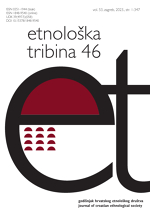Mediterranean Diet 3.0 – From Traditional Food to Sustainable Policies
Abstract
This paper will try to sketch the conceptual transformations of the Mediterranean diet from the second half of the 20th century to the present. This undoubtedly popular food model, which combines various food cultures of the Mediterranean, was initially recognized due to its health benefits, contributing to the prevention of cardiovascular diseases. The initial impulse for the global popularity of the Mediterranean food culture, which came from medical and nutrition sciences, has helped simplify, in the long run, the complex food systems of the Mediterranean, which have been recognized as a homogeneous culinary and cultural pattern since the 2000s. After the Mediterranean diet was inscribed on the UNESCO Representative List of the Intangible Cultural Heritage of Humanity in 2010, the understanding of this food culture changed. Today, the Mediterranean diet is being examined within the context of sustainable development policies and the protection of biodiversity and ecosystems with the aim of developing new long-term political and economic models within the necessary transformations of present food systems towards greener and more sustainable solutions.
Ključne riječi
traditional cooking; Mediterranean; Mediterranean diet; intangible heritage; sustainable food policy; sustainable diet
Downloads
Published
Issue
Section
License

